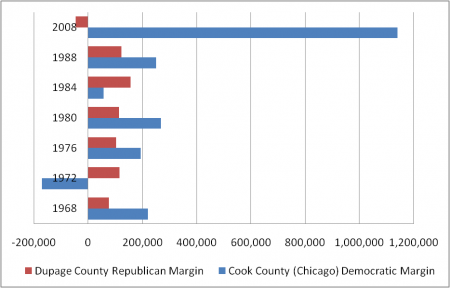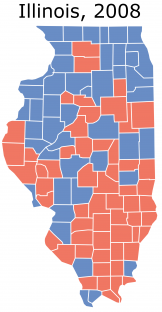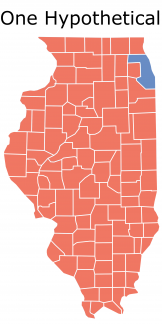This is the first part of a series of posts analyzing competitive Senate elections in blue states. The second part, which analyzes New York, can be found here.
Illinois
In November 2010, Democratic State Treasurer Alexi Giannoulias will face off against Republican Congressman Mark Kirk, in what looks to be a competitive Senate race. A heavily blue state, Democrats have been hurt by a bad national environment coupled with continuing fall-out from the Rod Blagojevich scandals.
Out of the three states being analyzed (the other two being California and New York), Illinois is the state in which Republicans are strongest. Out of the three, it is also the state with the most competitive forthcoming election. This post will analyze the political contours of the state, and the long and difficult path Mr. Kirk must tread for victory.
With respect to demographics, Illinois is structured very simply. It has three parts: Chicago, its suburban metropolis, and the mostly rural downstate.
To win, Congressman Mark Kirk will need to run a gauntlet of challenges in each of section of the state. He must capitalize on Republican strength downstate, revive it in the suburbs, and hope that Chicago turn-out is depressed. If done properly, this will result in a close-run, Scott-Brown type victory.
More below.
Downstate Illinois
Mr. Kirk’s easiest task should be here. Much of downstate Illinois has more in common with Kentucky and Missouri than far-north Chicago. Like these two states, the region has been trending Republican: Bill Clinton did far better than Barack Obama here.
There are several complicating factors. Downstate Illinois has several population centers – but these cities tend to vote less Republican (they all voted for Obama, for instance). Moreover, Mr. Kirk hails from the Chicago metropolis and has a reputation as a moderate congressman; he may not play too well with rural conservatives.
Nevertheless, the region constitutes the Republican base, and Mr. Kirk will need every vote he can get. He should be able to win downstate Illinois quite comfortably. He will have to. After all, President George W. Bush won practically every single county here – and he lost Illinois by double-digits.
Chicago’s Suburbs
The true test of Mark Kirk’s candidacy will come in the Chicago suburbs. His task is doable, but not exactly easy.
There is good news and bad news for Republicans. First the good news: unlike other solidly blue states, the Chicago suburbs still vote Republican. Like Orange County, for years their strength kept Republicans competitive in Illinois. Take a look at suburban DuPage County:

(Note: A negative margin indicates that Democrats lost Cook County, or that Republicans lost DuPage County.)
Even after Democrats started winning suburbs, during President Bill Clinton’s time, Chicago’s suburbs continued voting Republican. In 2004, for instance, George Bush won DuPage county by a little less than 10%.
The bad news for Republicans is that each election, they win the suburbs by a little less. In 2008 President Barack Obama swept DuPage County and the rest of Chicago’s suburbs by double-digits. This victory constituted the culmulation of decades of leftward movement.
The test for Mr. Kirk is the extent to which he can reverse this trend. He will not just have to win the suburbs, but turn the clock back two decades – back to the glory years in which Republicans won around 70% of the vote in DuPage County. (Mr. Kirk will probably not have to do that well, given rising Republican strength downstate.)
Is this doable? Given that Republicans seem to be winning suburbs everywhere this year, it is certainly possible. Mr. Kirk, moreover, has spent a decade representing a Chicago suburb congressional district; this is why Republicans have nominated him.
Chicago
43.3% of Illinois residents live in Cook County, home to America’s third-largest city. Of these, half call Chicago home; the other half live in an inner ring of suburbs.
If God decided to create the ideal Democratic stronghold, he would get something like Chicago. The city is heavily populated by black and Latino minorities, mixed together with a dollop of white liberals. As a cherry on top, it is also home to President Barack Obama – and Chicagoans are highly aware of this fact.
Whether he loses or wins by a landslide, Mark Kirk will not win Cook County. He will just have to take the blow, cross his fingers, and pray that minority turn-out is low (as it has been, this year). That is not a good strategy, but it is the best Republicans can do when 89% of them are white, and they are competing in a minority-majority city.
Conclusions
So what does Mr. Kirk have to do? Say that he gets 35% of the vote in Cook County – propelled by inner-ring suburban strength and minority apathy – and wins a landslide everywhere else in the state (for instance, a 3:2 margin). This gives him 50.3% of the vote in the 2008 Illinois electorate. If white Republicans downstate turn out, and minorities in Chicago do not, Mr. Kirk may get bumped up to a 2-3% victory.
As we will see, this task is easier compared to the challenges Republicans face in California and New York. In Illinois they can (barely) get away with a white-only coalition. In California Republicans absolutely must win minorities – a novel challenge. As for New York – it is similar to Illinois, except that New York City is double the size of Chicago. And upstate New York is trending Democratic.
–Inoljt, http://mypolitikal.com/

